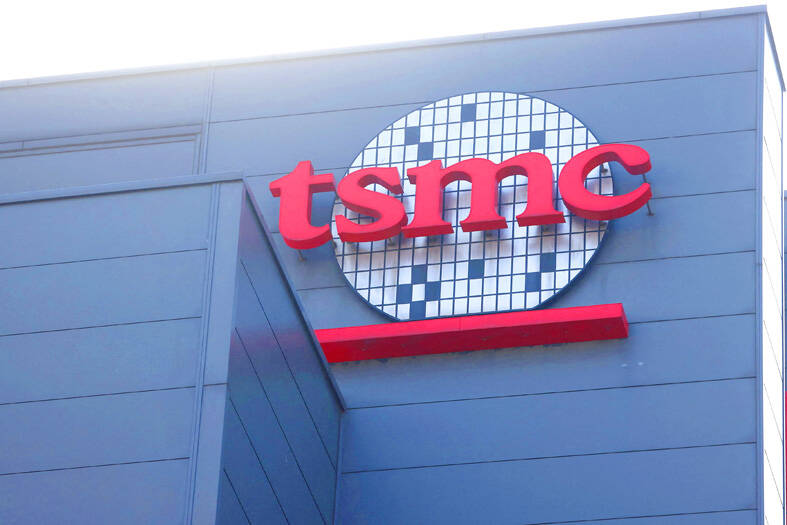Three Taiwanese firms made this year’s Global 500 list of the world’s most valuable brands published by London-based brand valuation and strategy consultancy Brand Finance.
The Taiwanese companies in the rankings are Taiwan Semiconductor Manufacturing Co (TSMC, 台積電) in 87th spot, Taipei Fubon Commercial Bank (台北富邦銀行) in 425th and a newcomer, Chunghwa Telecom Co (中華電信), in 447th, the Brand Finance Global 500 and IT Services 25 report released at the World Economic Forum in Davos on Wednesday showed.
Hsinchu-based TSMC, the world’s largest contract chipmaker, moved ahead from last year’s ranking at 93rd, while Taipei Fubon Bank rose from 385th.

Photo: Reuters, Ann Wang
Amazon.com Inc ranked as the world’s most valuable brand despite losing US$51 billion in value this year, with Brand Finance valuing Amazon’s brand at US$299.28 billion.
Apple Inc lost its top ranking after losing US$57.6 billion, finishing with a brand value of US$297.51 billion, followed by Google (US$281.38 billion), Microsoft Corp (US$191.57 billion) and Walmart Inc (US$113.78 billion).
Rounding out the top 10 were Samsung Group, Industrial & Commercial Bank of China Ltd (中國工商銀行), Verizon Communications Inc, Tesla Inc and TikTok.
The US has the most companies in the rankings, with 201 companies listed (49.7 percent), ahead of China’s 79 (17.9 percent) and Germany’s 24 (6 percent), the report said.
Brand Finance evaluates the strength of brands and quantifies their financial value to help organizations make strategic decisions.
The consultancy conducts more than 5,000 brand valuations every year, by assessing companies’ business model and performance, customer satisfaction, employee engagement and corporate social responsibility.

PERSISTENT RUMORS: Nvidia’s CEO said the firm is not in talks to sell AI chips to China, but he would welcome a change in US policy barring the activity Nvidia Corp CEO Jensen Huang (黃仁勳) said his company is not in discussions to sell its Blackwell artificial intelligence (AI) chips to Chinese firms, waving off speculation it is trying to engineer a return to the world’s largest semiconductor market. Huang, who arrived in Taiwan yesterday ahead of meetings with longtime partner Taiwan Semiconductor Manufacturing Co (TSMC, 台積電), took the opportunity to clarify recent comments about the US-China AI race. The Nvidia head caused a stir in an interview this week with the Financial Times, in which he was quoted as saying “China will win” the AI race. Huang yesterday said

Nissan Motor Co has agreed to sell its global headquarters in Yokohama for ¥97 billion (US$630 million) to a group sponsored by Taiwanese autoparts maker Minth Group (敏實集團), as the struggling automaker seeks to shore up its financial position. The acquisition is led by a special purchase company managed by KJR Management Ltd, a Japanese real-estate unit of private equity giant KKR & Co, people familiar with the matter said. KJR said it would act as asset manager together with Mizuho Real Estate Management Co. Nissan is undergoing a broad cost-cutting campaign by eliminating jobs and shuttering plants as it grapples

The Chinese government has issued guidance requiring new data center projects that have received any state funds to only use domestically made artificial intelligence (AI) chips, two sources familiar with the matter told Reuters. In recent weeks, Chinese regulatory authorities have ordered such data centers that are less than 30 percent complete to remove all installed foreign chips, or cancel plans to purchase them, while projects in a more advanced stage would be decided on a case-by-case basis, the sources said. The move could represent one of China’s most aggressive steps yet to eliminate foreign technology from its critical infrastructure amid a

MORE WEIGHT: The national weighting was raised in one index while holding steady in two others, while several companies rose or fell in prominence MSCI Inc, a global index provider, has raised Taiwan’s weighting in one of its major indices and left the country’s weighting unchanged in two other indices after a regular index review. In a statement released on Thursday, MSCI said it has upgraded Taiwan’s weighting in the MSCI All-Country World Index by 0.02 percentage points to 2.25 percent, while maintaining the weighting in the MSCI Emerging Markets Index, the most closely watched by foreign institutional investors, at 20.46 percent. Additionally, the index provider has left Taiwan’s weighting in the MSCI All-Country Asia ex-Japan Index unchanged at 23.15 percent. The latest index adjustments are to